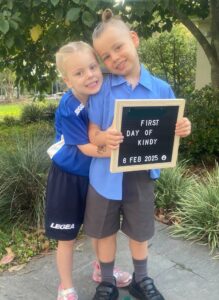As humans we all have an innate desire to connect and the primary way, is through communication.
It’s important to recognise that everyone communicates in a variety of ways. You may communicate through gesture, shared gaze, body language, play, spoken language, using pictures or a device. We use emojis in messages to convey a feeling. At an event, we might make eye contact with our partner across the room to signal “I’m ready to go home”. We wave to greet people that are too far away to hear our voice.
Have you ever considered behaviour as a form of communication? If they don’t have the vocabulary or the words to tell you how they feel, they’re going to SHOW you through body language and behaviour. It’s the most effective way of getting the message across.
We use more than just our voices to communicate.
The Australian Bureau of Statistics identified that 1.2 million Australians have a communication disability. Communication disabilities can affect a person’s ability to understand and be understood by others, which can be immensely frustrating.
Speech Pathology week is from the 20th to 26th August. This is a week for us to celebrate speech pathologists and to raise awareness about what we do. Our role goes beyond helping people speak, our goal is to help people communicate using all the different ways listed above.
Communication is a basic human right and something that all speech pathologists fundamentally believe in.
We are so lucky to work with children and their families to help them on their communication journey. At the Foundation, we emphasise the importance of recognising and respecting the different ways children communicate. Our team work on communication using spoken language as well as Augmentative and Alternative Communication (AAC). AAC includes modalities such as Key Word Sign, pictures, push buttons, iPads and dedicated devices.
Everyday we see children make gains in their communication skills when we nurture their preferred method of communication. When we lean into their strengths and assume competence, children are given the tools to express their thoughts and are supported to understand the complex world around them!
We asked our team, “What’s your favourite thing about being a speech pathologist?” Here’s what they said:
“I love watching the children develop and achieve their goals.” Brianna
“I love connecting with the child and having those little ‘aha’ moments. The smiles I get from the child when I’ve understood them.” Emma
“I love early intervention and seeing the progress they make when you support them.” Bianca
“I love giving children a voice, to see them have autonomy and choice.” Ei Leen
“I love playing with children in meaningful ways that support them to build relationships and connections with those around them.” Anwyn
Our therapists had some tips to share on how YOU can support communication no matter where your child is at:
- Make communication fun and meaningful. Don’t be afraid to be a little silly!
- Listen carefully and observe – how do they respond?
- Lean into their strengths and incorporate their interests.
- Understand there are many ways to communicate (speech, gesture, play, AAC etc). All are valid and all are important.
- Find opportunities within your everyday routine e.g. give them choices when getting dressed in the morning, pack their bag for daycare together or model different words when they’re playing in the bath.
- If you’re having difficulty understanding the child, ask them to ‘show’ you or offer them choices.
- Be patient, give them time to process what you’ve said and time to respond.
Everyone can support communication. You never know the impact you may have when you give someone the space to share their thoughts and validate their attempts at communication. You can help them feel seen and heard!
Written by Anwyn Yap, Lead Speech Pathologist


